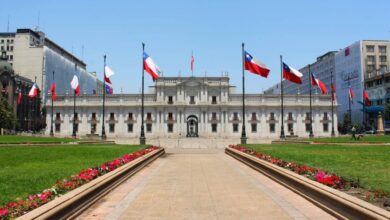As Chile faces a historic decision, President Gabriel Boric's call for a referendum on a new constitution draft—penned in the shadow of a divisive political past—sets the stage for a nation's pivotal moment of choice.

Photo: 02/11/2023.- President Gabriel Boric of Chile speaks to the media. EFE/EPA/Chris Kleponis / POOL
Latin American Post Staff
Escucha este artículo
Leer en español: En la encrucijada de la historia: el enigma constitucional de Chile
A Momentous Decision for Chile
In the halls of Chile's Congress, a profound sense of historical consequence was palpable as President Gabriel Boric initiated the final leg of a constitutional journey that could reshape the nation's identity. Chileans stand on the cusp of a monumental decision: to adopt a new constitution that veers from the left-leaning draft they previously dismissed to one that swings the pendulum towards conservative governance. This crucial moment marks not just a political choice but a moral and societal referendum for the people of Chile.
The earlier rejection of what was touted as one of the globe's most avant-garde constitutions has ushered in a phase where the proposed charter is now steeped in conservatism. "The definitive time for citizens has begun, and now it is their voice and their decision that truly matter," Boric asserted, underscoring the gravity of the decision before the nation.
Contentious Clauses in Focus
Amid the legal tapestry of the new document lies an array of contentious articles poised to redefine life in Chile. A particularly divisive clause, delicately altering the nation's stance on the protection of unborn life, has rattled the populace, stirring concerns of a possible total abortion ban. This issue cuts deep into the fabric of Chilean society, challenging the current laws that permit abortion under stringent conditions.
Equally polarizing is the clause concerning house arrest for terminally ill prisoners, which has ignited a firestorm of debate. Detractors fear it may inadvertently absolve perpetrators of crimes against humanity committed during General Augusto Pinochet's infamous regime. The shadows of the past loom large as the country grapples with the moral implications of such a provision.
Economic Implications at Play
Further stoking the embers of controversy is the proposed abolition of a property tax on primary residences, a critical stream of state revenue traditionally sourced from the wealthier strata. This has rallied many local leaders against the draft, viewing it as a potential blow to fiscal stability.
The Boric administration caught between the tides of political allegiance and a pledge of neutrality, watches as allies voice staunch opposition to the new charter. With 17 chapters and 216 articles, the Constitutional Council's endorsement of the document by a decisive vote reflects the stark division within the country's political landscape.
President Boric's call to the citizens to deliberate on the draft's ability to address Chile's pressing concerns is an appeal for introspection and unity. He stands committed to respecting the public's verdict, whether it propels his administration into implementing the new constitution or steers them to persist under the enduring framework of the Pinochet-era statutes.
As opinion polls signal scant hope for the new draft's acceptance, a significant portion of the electorate remains trapped in indecision, hinting at the undercurrents of a profoundly conflicted nation.
Also read: Chilean President Boric Addresses Humanitarian Concerns with President Biden
A Call for Deliberation and Unity
The President of the Constitutional Council, Beatriz Hevia, representing the conservative bloc, ceremoniously presented the document to Boric. She remains hopeful, envisioning the referendum as a closing chapter to constitutional disarray and the dawn of a harmonious and flourishing Chile.
The stage is set for December 17, when Chileans will cast their votes in a referendum that is more than a political process—the soul-searching of a nation. The outcome will either endorse a new constitutional path or uphold the controversial charter of a bygone era.
A year has passed since the populous rebuffed a progressive constitution that sought to redefine Chile as a plurinational state, recognize Indigenous territories, and foreground environmental and gender equity concerns. Now, the people are called again to make a choice that will echo through the annals of their history, determining the trajectory of their cherished homeland. At this critical juncture, every ballot will whisper a story of Chile's quest for identity, governance, and justice—a testament to the enduring spirit of democracy in action.




